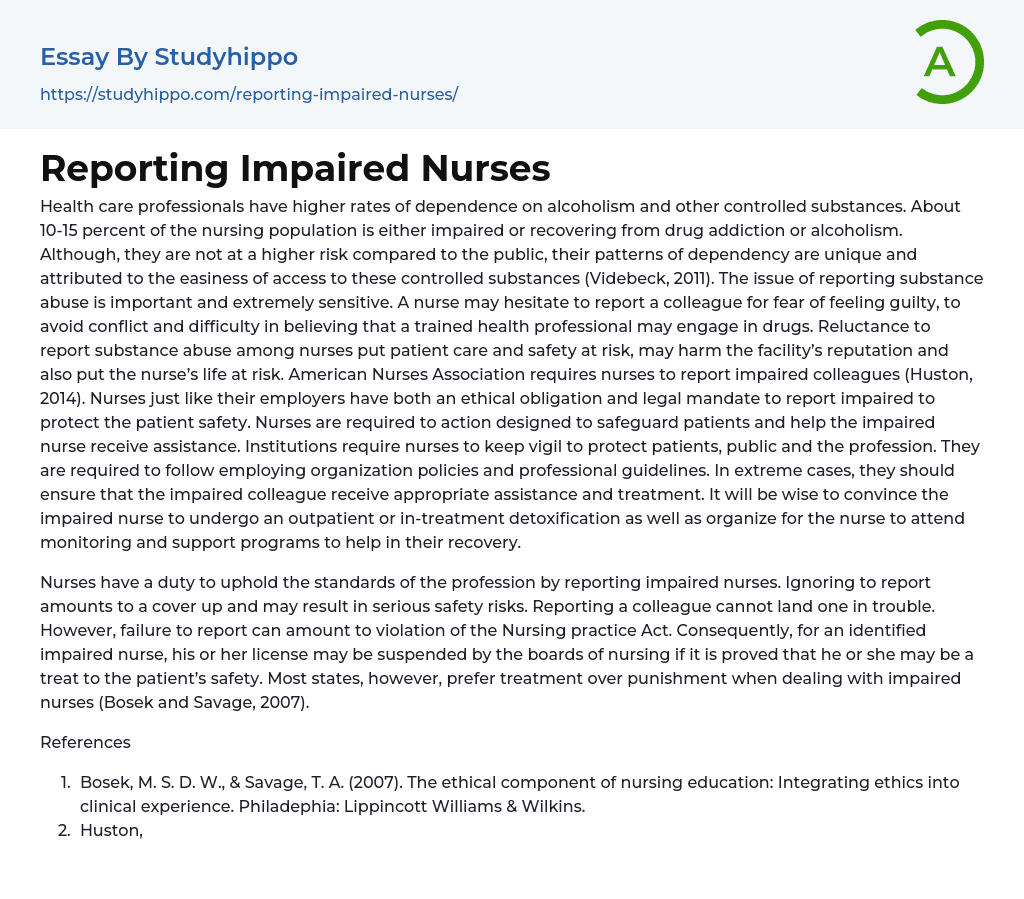Health care professionals have higher rates of dependence on alcoholism and other controlled substances. About 10-15 percent of the nursing population is either impaired or recovering from drug addiction or alcoholism. Although, they are not at a higher risk compared to the public, their patterns of dependency are unique and attributed to the easiness of access to these controlled substances (Videbeck, 2011). The issue of reporting substance abuse is important and extremely sensitive. A nurse may hesitate to report a colleague for fear of feeling guilty, to avoid conflict and difficulty in believing that a trained health professional may engage in drugs. Reluctance to report substance abuse among nurses put patient care and safety at risk, may harm the facility’s reputation and also put the nurse’s life at risk. American Nurses Association requires nurses to report impaired colleagues
...(Huston, 2014). Nurses just like their employers have both an ethical obligation and legal mandate to report impaired to protect the patient safety. Nurses are required to action designed to safeguard patients and help the impaired nurse receive assistance. Institutions require nurses to keep vigil to protect patients, public and the profession. They are required to follow employing organization policies and professional guidelines. In extreme cases, they should ensure that the impaired colleague receive appropriate assistance and treatment. It will be wise to convince the impaired nurse to undergo an outpatient or in-treatment detoxification as well as organize for the nurse to attend monitoring and support programs to help in their recovery.
Nurses have a duty to uphold the standards of the profession by reporting impaired nurses. Ignoring to report amounts to a cover up and may resul
in serious safety risks. Reporting a colleague cannot land one in trouble. However, failure to report can amount to violation of the Nursing practice Act. Consequently, for an identified impaired nurse, his or her license may be suspended by the boards of nursing if it is proved that he or she may be a treat to the patient’s safety. Most states, however, prefer treatment over punishment when dealing with impaired nurses (Bosek and Savage, 2007).
References
- Bosek, M. S. D. W., & Savage, T. A. (2007). The ethical component of nursing education: Integrating ethics into clinical experience. Philadephia: Lippincott Williams & Wilkins.
- Huston, C. J. (2014). Professional issues in nursing: Challenges & opportunities.
- Videbeck, S. L. (2011). Psychiatric-mental health nursing. Philadelphia: Wolters Kluwer Health/Lippincott Williams & Wilkins.
- alcoholism essays
- Casino essays
- Cell Phone Addiction essays
- Heroin essays
- Smoking essays
- Social Media Addiction essays
- Tobacco essays
- Administration essays
- Architect essays
- Discipline essays
- Doctor essays
- Engineer essays
- Farmer essays
- Hunter essays
- Labor essays
- Model essays
- Nurse essays
- Pilot essays
- Police Officer essays
- Professionalism essays
- Social Work essays
- Stakeholders essays
- Teamwork essays
- Measure essays
- Nursing Profession essays
- Psychometrics essays
- Why Did You Choose Nursing essays
- Why I Want to Be a Nurse essays




